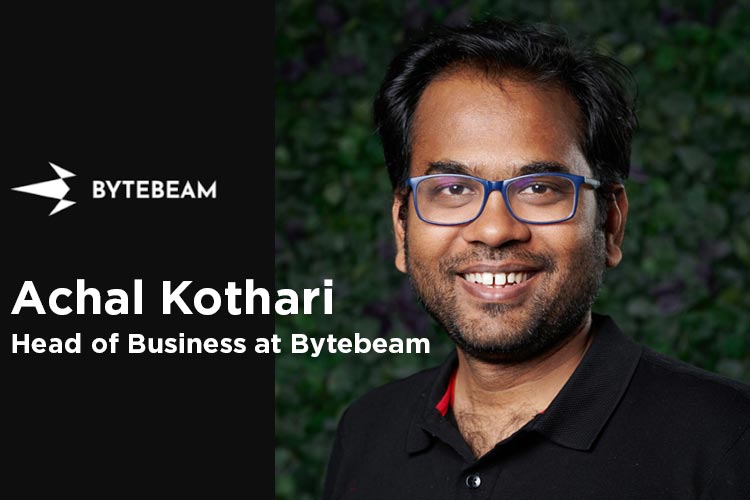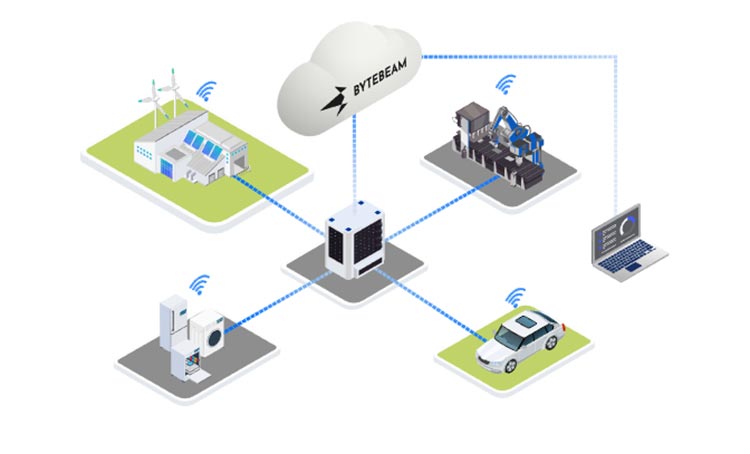
The Internet of Things (IoT) industry has been growing tremendously since the last couple of years and it has now become an imperative part of human’s lives and also for business and communication. Speaking of globally, there are 14.4 billion devices where there are almost two IoT devices for every person on the planet. According to the experts, by the end of 2050, there will be 24 billion IoT devices all over the world. The technology is playing a key role in various verticals, but in an exclusive interaction with CircuitDigest, Achal Kothari, Head of Business at Bytebeam explains that IoT is playing its role majorly in the automotive industry’s electric vehicle segment and the technology will play a very important role in the transforming the automobile industry in the coming five years. But, there are some additional grave obstacles that need to be tackled soon.
Q. Can you please elucidate why Bytebeam was formed and when? What is your current mission and vision?
The initial idea came from one of our co-founder who is leading the software division at Ather Energy and he was setting up the complete software backend for the electric vehicle and while doing that he realized that there are a lot of challenges when it comes to putting together the smart back-end or the IoT back-end. After leaving Ather, he was consulting with a few automotive companies for their roadmap and the realization was that this is a universal problem and a good back-end for automotive applications will be required. But, when we looked around for solutions, there were no good solutions that were existing. That is where the idea of founding Bytebeam came in and we realized the problems and started building solutions.
There is definitely a gap for a good backend to make it easier for companies to develop any kind of smart vehicles or smart appliances. Every product and device around us will now become smart and what I mean by smart is that it will be able to communicate with the user and it will be able to make some decisions on its own. There will be various algorithms and AI, which will help the products to make some contextual decisions on their own. We are now very certain that this will happen in the next five to ten years and Bytebeam wants to be the enabler in that journey wherein we help companies to build smart products, smart vehicles, and smart devices with a lot of ease.
Q. Since the coronavirus pandemic, how have you changed your business strategies that are helping you stay ahead of the competition? Would you like to share any success stories of late?
In a lot of ways, the COVID pandemic has been actually helping for the IoT industry. The reason being that there are limitations in people’s movement and there were health issues and lockdowns and various other things. Now, the whole industry understands monitoring their products and factories, but the whole idea of automating and monitoring the products, devices, and the factory as a whole has become the mainstream. And companies are actually trying to automate a lot of their operations. In that way, the receptiveness of IoT, which was still considered a futuristic technology, is what COVID has done is fast processed the adoption of this whole technology. This has also led to a lot of product innovation. For example, during the pandemic people realized that ordering from Swiggy is also not an option. That is where one of the companies we are working with were assisting people to cook good meals, it was like an assistant cooking use case. Idea is people must eat good food with the help of technology. Covid has shifted technology in a very interesting way.

Q. In the last three years, how has the IoT industry changed? Would you like to highlight any additional challenges and how Bytebeam is tackling the challenges?
Another change that has happened in 2-3 years is the whole approach to product development because people are expected to do a lot of agile product development. A lot of product development is happening right now in India. IoT is very helpful in this case because you are able to collect data in real time. You are able to do limited launches and you can see what is happening on the product you have launched. You don’t have to wait for customer’s feedback or reviews to improvise. Also a lot of hardware startups are now coming out of India. In the last 25-30 years India emerged as a big software hub and going forward in the coming 2-3 years, you can see a wave of hardware startup companies coming out of India.
In the automotive industry, e-scooters from Ola and Ather are now interacting with people in a lot of ways. There are use-cases of fleet management and use-cases like remotely debugging issues on the vehicles. One of the challenges is that a lot of companies in the automotive space IoT are still restricted to tracking the vehicles and people are yet to comprehend the changes, which IoT can truly unlock. There is a lack of holistic thinking when it comes to IoT. People are thinking of it merely locating or tracking your devices. IoT is not only about tracking, it is more about monitoring the health of the devices. Security is one aspect which people are not actively thinking of, what if the device gets hacked or what if the information gets leaked.
Q. Currently, where do you see the growth of the IoT industry in India when compared to other advanced countries? What are the various ways in which India can boost its growth of IoT? Do you have any specific expectations from the government?
Government is already doing a lot in terms of pushing the startups but they need to focus more on innovation and must support it as much as possible. So, the hope and expectation from the government to create a lot more ecosystem for fostering the whole innovation part. People in the country are now doing a lot of innovative work, which was unbelievable 10 years back and they are happening in tier 2 and tier 3 cities as well. Governments must also focus on distributing the benefits of their initiatives and how it percolates at different levels. India is not now copying the western models of innovation.
The hardware products with IoT enabled infrastructure are already quite mature when you compare them with the western models. Even in automotive when Tesla was a leader when it launched IoT enabled vehicles, but in India Ather has done it much better when it comes to two wheelers. Generally, you see innovation happening in high priced products, but here it is happening on the two-wheeler front, which is already a mass market. Another good example is drones, a lot of good startups in the country are now coming up with top-notch use cases and similarly there is a lot happening on precision agritech as well.
Q. What are the various kinds of services and solutions you are currently offering to the industry? Would you like to talk about any game-changing specific solutions of Bytebeam in the coming years?
As said our mission is to provide a complete IoT back-end to make it very simple and easy for companies to start building their smart products. We have created the whole back-end from scratch. So, instead of putting or stitching a bunch of other solutions we have developed the whole technology in-house keeping in mind the IoT use-case and applications of the future. If the technology was retrofitted for something else people will need to do a lot of customization to make that technology work for their use-case. With Bytebeam, let’s say you are building a smart vehicle you don’t need to do a lot of customization to fit that technology, you can actually get started in 3-4 weeks time. When it comes to products, especially in the back-end, we are offering a complete device management dashboard.
Then, there is data management and data visualization dashboard where we help customers to identify the data coming from different devices. We also have a fleet management dashboard. Let’s say, you have fleets of vehicles running across the state and city you can monitor them. Then we have features like remote diagnostics, through which you can not only know what kind of issues are happening, but they will be alerted by us. We even help them remotely login to the product when there is a problem in the vehicle platform. Bytebeam helps fix certain issues through over the air updates. We are also working on streaming analytics. When you are gathering data from a device you get various streams of data. For example, a vehicle is a complex ecosystem, which is equipped with various kinds of sensors and data. Now, if something's gone wrong and you want to understand. We are then implementing a streaming analytics solution where you can stream data more in real time and in specific intervals. It helps in case of any major issues and debugging the process becomes much faster, and also saves cost.

Q. Currently, how many clients are you offering solutions? What are the various kinds of promising technologies you are expecting in the coming years? What are the changes you would like to see in the IoT domain globally in terms of technology?
We work in various verticals, but automotive is the major market where we cater our solutions and services mostly. This is because automotive is a lot more upfront in adopting IoT. Another reason we cater to this industry is because all the founders come from that background and that helps us to understand the challenges properly. Apart from that we are also working with smart home appliances companies and also energy monitoring companies be it grid or smart meters. Overall, we are now working with 20 plus companies rightnow. There is a lot of funding and investment in the automotive industry that helps the sector to adopt new technologies much faster. Right now, the electric penetration in commercial vehicles are not happening much in the country.

